Magic Blu-ray Movie
HomeMagic Blu-ray Movie 
MPI Media Group | 1978 | 107 min | Rated R | Oct 12, 2010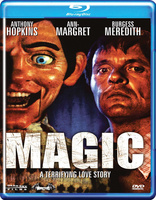
Price
List price:Third party: $19.17 (Save 23%)
Listed on Amazon marketplace
Buy it from YesAsia:
Movie rating
6.9 | / 10 |
Blu-ray rating
| Users | 3.3 | |
| Reviewer | 4.0 | |
| Overall | 4.0 |
Overview
Magic (1978)
A ventriloquist is at the mercy of his vicious dummy while he tries to renew a romance with his high school sweetheart.
Starring: Anthony Hopkins, Ann-Margret, Burgess Meredith, Ed Lauter, David Ogden StiersDirector: Richard Attenborough
| Horror | Uncertain |
| Psychological thriller | Uncertain |
| Thriller | Uncertain |
| Drama | Uncertain |
Specifications
Video
Video codec: MPEG-4 AVC
Video resolution: 1080p
Aspect ratio: 1.78:1
Original aspect ratio: 1.85:1
Audio
English: LPCM 2.0 Mono (48kHz, 16-bit)
Subtitles
English
Discs
50GB Blu-ray Disc
Single disc (1 BD)
Playback
Region A (locked)
Review
Rating summary
| Movie | 4.0 | |
| Video | 4.5 | |
| Audio | 4.5 | |
| Extras | 3.0 | |
| Overall | 4.0 |
Magic Blu-ray Movie Review
He's Just a Dummy
Reviewed by Michael Reuben August 31, 2014Magic was marketed as a horror film, and I can still remember screams from the theater audience I saw it with in 1978. But horror films have been radically redefined in the past three decades, and anyone watching Magic today and expecting the kind of shocks, gore and death toll to which modern audiences have become accustomed will be sorely disappointed. Magic is a psychological drama with several effectively violent scenes. The marketing hook still holds true—"A terrifying love story!"—primarily because it turns out to be ambiguous, as it was always intended to be. The talent involved in Magic was so prestigious that the end result was treated by contemporary reviewers somewhat dismissively. Shouldn't these big names be engaged in something less low rent? But precisely because Magic was made by first-rate craftspeople working in top form, the result holds up to repeated viewing nearly thirty years later. Two-time Oscar winning screenwriter William Goldman (All the President's Men) adapted his own novel, which was no small trick, because, as the author notes in the interview included with the Blu-ray extras, the book depended on shifts in narration that could not be replicated on film. Director Richard Attenborough, who passed away just recently, fit this small-scale effort between the epic efforts of A Bridge Too Far (1977) and Gandhi (1982), for which he would win Oscars for Best Director and Best Picture. And the future Hannibal Lecter, Anthony Hopkins, spent weeks teaching himself to perform magic and ventriloquism for the role of Corky, the show business sensation who suddenly finds that he's terrified of success—for good reason.
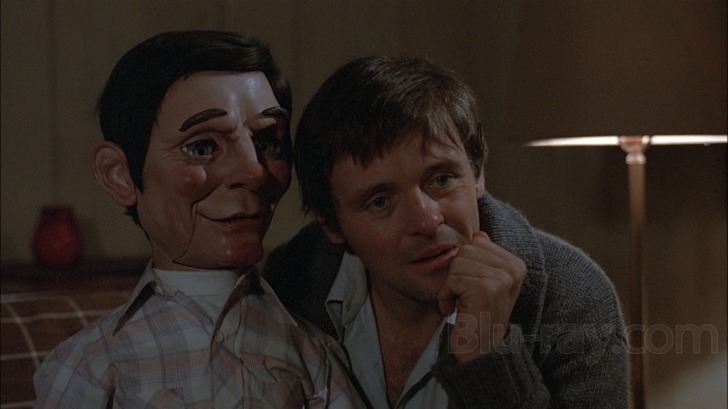
We never learn much about the youth of Hopkins' Corky (played as a boy by Brad Beesley). He grew up in the Catskills, a shy and awkward kid, and he apprenticed himself to a magician known as "Merlin" (E.J. André), who became the boy's surrogate father. But despite years spent perfecting the master's tricks, Corky had no stage presence. His first attempt at a live performance ends in humiliating failure, as the audience ignores him and Corky melts down on stage. Some years later, though, after the elderly magician has passed away, Corky is playing the very same club to sellout audiences. He's represented by the top agent in the business, Ben Greene (Burgess Meredith), whose nickname is "The Postman", because he always delivers. The key to Corky's sudden success is his new "sidekick", a dummy called Fats whose persona is the opposite of Corky's: loud, brash, obnoxious and obscene. While Fats cracks wise and insults everyone in sight (especially Corky), the magician can perform amazing feats without anyone noticing. Or, as Fats says, "While we're bullshittin', you could bring an elephant on the stage!" After a tour of major cities and a successful appearance on The Tonight Show, The Postman has Corky all lined up for a contract with a major network. But Corky is in trouble—and here anyone who is super-sensitive to spoilers may want to quit reading, although I'm not going to reveal anything that wasn't shown in the film's extensive marketing campaign. To create Fats, Corky channeled all the repressed anger and frustration of the shy boy with stage fright who couldn't step out of Merlin's shadow (or, as we see later in the film, do a lot of other things). Having found such an effective outlet for his aggression, Corky is gradually losing control of it. The part of him that expresses itself through Fats has taken on a life of its own, or at least that is the most common interpretation of Magic. Goldman and Attenborough have planted just enough suggestion of other possibilities to support alternative theories and leave audiences guessing. When the television network requires a routine physical exam as a condition of Corky's deal, he becomes irrationally fearful and flees to his old environs upstate. There he finds himself unexpectedly involved with a beauty from high school whom he could only admire from afar at the time, Peggy Ann Snow (Ann-Margret). Now, of course, Corky is rich and famous, and he has Fats to help him break the ice. If his behavior seems odd at times, well, isn't that often true of entertainers? An immediate problem is that Peggy Ann is married (unhappily) to her high school boyfriend, Duke (Ed Lauter), who disappears for days at a time, supposedly doing business as a hunting and fishing guide, but he resurfaces shortly after Corky arrives. An even greater problem is that The Postman, having invested substantial time and effort into promoting Corky's career, isn't likely to let him just walk away from a rich TV deal. The competing agendas of love and career would be hard enough for a normal person to navigate. For Corky, who is already struggling to suppress the battle for control raging inside him, the situation is impossible. Violence erupts. But how, when and against whom are not immediately obvious. Thanks to a combination of Goldman's script, Attenborough's direction and Hopkins' nuanced performance, the audience ends up in the interesting position of sympathizing with a killer and hoping he'll manage to get away with it. After all, it wasn't Corky who did anything bad. It was Fats. Many of the creepiest moments in Magic are achieved simply by placing the figure of Fats, with his leering grin and fixed eyes that seem to be looking everywhere, in a strategic position in the frame so that he really does seem to be participating in the action, even when Corky isn't operating his head or speaking for him. Other scenes vibrate with the sheer electricity of the performances. An intense encounter between Corky and Peggy Ann over a deck of cards is so convincingly played by Hopkins and Ann-Margret that it's genuinely disturbing. One of the film's best sequences involves a test that The Postman poses to Corky. Can he silence Fats for just five minutes? He might as well pour an alcoholic his drink of choice, then ask him not to touch it. William Goldman says it's his favorite scene in the film, and it's easy to see why.
Magic Blu-ray Movie, Video Quality 
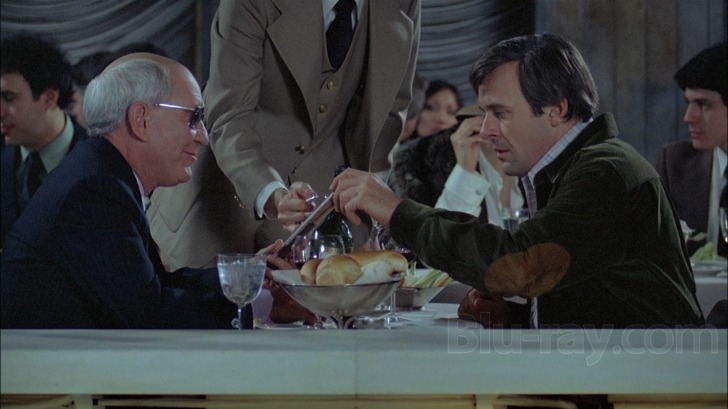
Magic was photographed by the versatile Victor Kemper, who has worked with everyone from John Cassavetes (Husbands) to Tim Burton (Pee-wee's Big Adventure). As Kemper says in the accompanying interview, his challenge on Magic was to craft a change in the photography from "ordinary and pleasant" to eerie and disturbing without calling attention to the cinematographer's manipulation (a cardinal sin for a cameraman of Kemper's generation). MPI Media's 1080p, AVC-encoded Blu-ray is an impressive presentation of Magic, although I suspect it will inevitably disappoint those Blu-ray afficionados who expect that the format will magically confer crystalline digital clarity on every catalog title. The grungy New York City of the late Seventies looks very much as it did in those days, as do the deserted environs of the off-season Catskills resort where Corky hides out from the pressures of show business. The blacks of darkened interiors and country nights are deep and finely graded, and the detail of hair, clothing and facial expressions (especially those of Fats) are beautifully rendered. The image has the nature texture of a well-preserved grain pattern, undisturbed by filtering or artificial sharpening, and the average bitrate is a healthy 30.98 Mbps. (Note: A user review at Blu-ray.com complains that the disc's colors are "drab". Indeed they are. That is and always has been the film's palette, with the exception of some of Fats's features. The Blu-ray can't be faulted for accurately rendering the film.)
Magic Blu-ray Movie, Audio Quality 
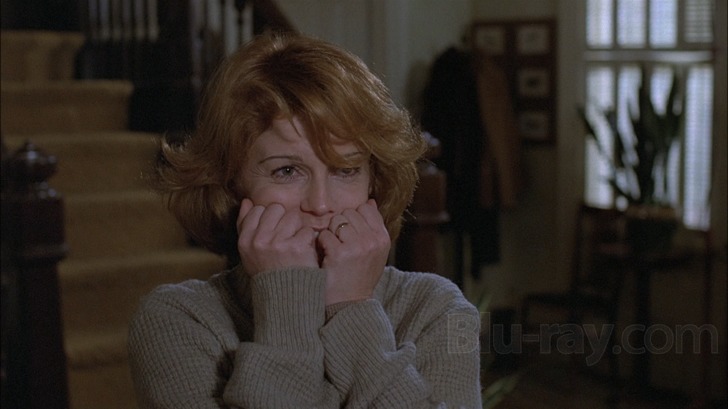
Magic was released with a mono soundtrack, which has been reproduced on Blu-ray in lossless PCM 2.0 with identical left and right channels. The track has impressive dynamic range that does full justice to Jerry Goldsmith's excellent score (one of his most poignantly emotional) and to the film's major set pieces. The dialogue is always clear, so much so that you can detect the common overtones between Hopkins' American accent as Corky and the voice he uses for Fats.
Magic Blu-ray Movie, Special Features and Extras 
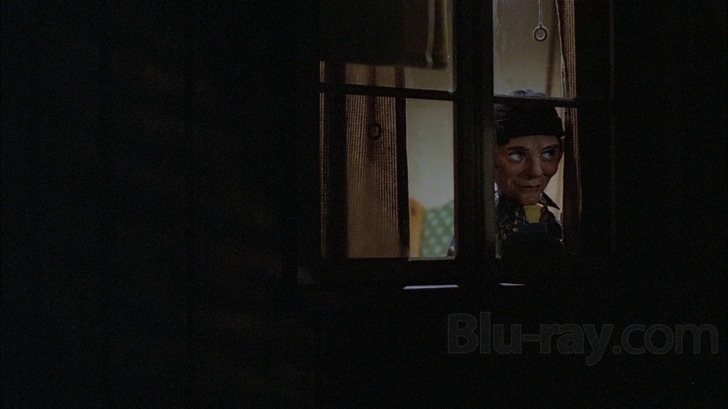
The extras have been ported over from the DVD released in 2006 by MPI Media's Dark Sky Films label, minus the photo gallery but plus the "Screenwriting for Dummies" interview with William Goldman.
- Screenwriting for Dummies (480i; 1.78:1, enhanced; 16:06): Goldman is always worth listening to, and this interview is no exception, as he provides background on the film's development (including tales of casting with its original director, Norman Jewison), as well as tales from the set and his own appreciation of the work of the cast and crew.
- Fats and Friends (480i; 1.78:1, enhanced; 26:53): A history of ventriloquism, both as an act and in the movies, featuring Dennis Alwood, who acted as consultant to the production of Magic.
- Victor Kemper: Cinematographer (480i; 1.78:1, enhanced; 11:23): The veteran DP talks about his work and career, with special attention to Magic.
- Ann-Margret make-up test (480i; 1.78:1, enhanced; 1:19): With a musical accompaniment.
- Anthony Hopkins radio interview (480i; 1.78:1, enhanced; 3:20): Against a background of what appear to be raw dailies from Magic, Hopkins discusses his background and his career up to that point.
- Trailer (480i; 1.78:1, enhanced; 2:09).
- Anthony Hopkins interview (480i; 1.33:1; 6:16): The interview is for Spanish TV, which requires the interviewer to translate both his questions and Hopkins' answers.
- TV and Radio Spots (480i; 1.33:1)
- English TV Spot #1 (0:32)
- English TV Spot #2 (0:32)
- English Radio Spot #1 (0:30)
- English Radio Spot #2 (0:33)
- Spanish Radio Spot (0:31)
- Spanish TV Spot #1 (0:37)
- Spanish TV Spot #2 (0:32)
Magic Blu-ray Movie, Overall Score and Recommendation 
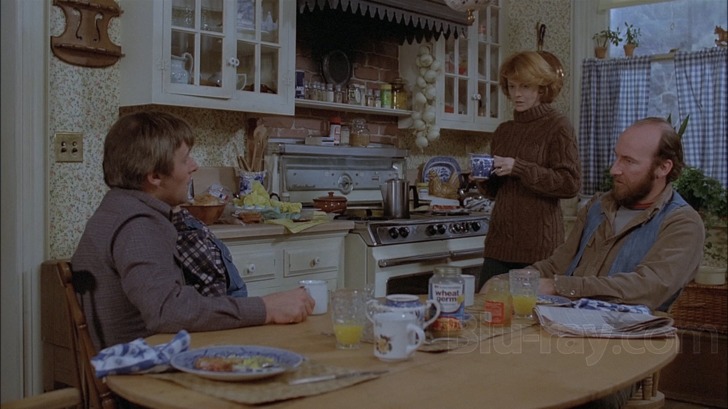
Ever since Hopkins' Oscar-winning performance in The Silence of the Lambs, he has been a steady and recognizable presence in films, playing every kind of role imaginable. When he made Magic, however, Hopkins was less famous, which may partly explain why his remarkable performance was overlooked at awards season. As Victor Kemper points out, the role of Corky was both technically demanding and emotionally complex. Ann-Margret does some of her best work ever, as a sadder but wiser woman who regrets her choice, suddenly glimpses a possible new future, but then realizes that future may be an illusion. And Burgess Meredith's Postman is a triumph: a comical slice of show biz ham who turns deadly serious at just the right moment. Hovering over all of them is Fats, who's a very funny guy—until he's not. The performances made Magic work at the time, and they've kept it fresh ever since. Highly recommended.
Similar titles
Similar titles you might also like

Psycho IV: The Beginning
1990

Split 4K
2016

Marrowbone
The Secret of Marrowbone
2017

Maniac
2-Disc Special Edition
1980

The Lodge
2019

The Eyes of My Mother
2016

The Rite
Movie Only
2011

The Haunting of Hill House
Extended Director's Cut
2018

Bates Motel: The Complete Series
2013-2017

What Keeps You Alive
2018

Pyewacket
2018

They Look Like People
Slipcover in Original Pressing
2015

Schizo
1976

Psycho II
Collector's Edition
1983

Lovely Molly
2011

The Witch Who Came from the Sea
Special Edition
1976

Lights Out 4K
2016

What Ever Happened to Baby Jane?
Warner Archive Collection
1962

It Lives Inside
2023

Swallow
2019